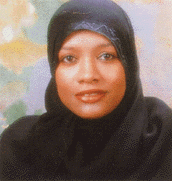 
|
|
 he poet Saliha Ghabash belongs to a generation of poets who compose their poems in classical Arabic. She is particularly known for her short stories. he poet Saliha Ghabash belongs to a generation of poets who compose their poems in classical Arabic. She is particularly known for her short stories.Her first collection of poems, "Waiting for the Sun", has been published by the Emirates Book Association, and received widespread acclaim from literary circles in the UAE,bringing Saliha's name to a wider public. Saliha Ghabash is Editor in Chief of "Ashri'a" ("Sails") magazine published by the UAE Writers League,of which she is the head. Reem Mahmoud from Al Shindagha met with her. Is Arabic Culture progressing?I think Arabic culture is witnessing a kind of ebb and flow at the moment. This is mainly due to well educated Arabs, some of whom are attached to modern culture and reject our cultural heritage, while the rest are proud of their culture and civilisation but feel it is irrelevant to the modern world, while others isolate themselves and refuse to adopt any new cultural aspect. In fact, very few have managed to keep their creative balance between modernism and their cultural inheritance. As a poet, how do you view the situation of poetry today? Every type of literature has its own importance. Even though poetry has lost some of its importance in favour of other types of literature, it seems that this is partly due to the poets themselves. In the past, poets used to tackle subjects of interest to everybody, using a formal poetic and symbolic language. Today, poets use a very vague and confusing style, as if the poet was writing for himself and not considering his readers. Has the poet been affected by the way modern life allows very little time for meditation which is the main catalyst of creativity? Yes, people are compelled to follow the fast pace of life, and the reader is no longer ready to look for a poetic image and meditate its meaning. The public has become more and more tempted by convenience. Is poetry a vanishing literary type? No. I'm confident that poetry will survive and remain in its various forms, both traditional and contemporary, as long as there are creative poets, because the relationship between man and poetry reaches back to pre-history when there was only the spoken word, and the Arabic people have a particular affinity to it. What will be the importance and place of poetry in the future is something I am however, unable to define. What is your source of inspiration? Seeing the reality of life gives me the opportunity to grab details from it to craft my poetry. I don't confine myself to a specific style and my subjects are wide ranging, poetry is for all things true. If I write a sentimental poem, I need to understand and put into context feelings and emotions in a particular situation. How did you grow as a poet? Since childhood, my language teachers were impressed with the way I expressed myself. As a teenager, I was highly sensitive and very different from my schoolfriends. I seemed to have a deeper understanding of things. I would be very influenced by the poems I used to read, and the movies I used to see, and I would wish I had a means of expressing myself. My first attempts were through short stories, a number of which were published in the local newspapers. I also sent a short story to the Book Association. At university, I specialised in poetry and its rules, I felt that poetry was my most important space. Then I published one of my poems in the amateur section of one of the magazines edited by the poet Habib Al Sayegh. He encouraged me to write more poetry and this has stimulated me a lot. Does working affect your creativity? Being an employee has two contradictory effects. It often happens that moments of creativity are overwhelmed in the rush of work, leaving very little time to write. On the other hand, working and meeting people leaves you connected with reality and different characters, and this can be an inspiration. What do you think about popular poetry? Popular poetry is expanding while classical poetry is less abundant. The popular poet writes hundreds of poems, while classical poets are not so productive. Some classical poets of the past have left a legacy of great poetry that still has resonance today, while the popular poets of the past are scarcely remembered today. Popular poetry does not favour poets, because it is difficult to memorise, and cannot easily be handed on from one generation to the another. I am not against popular poetry, but urge the current generation of poets to use classical Arabic for their poetry. What can be done to encourage the poetry? Opportunities must be given to everybody to develop their talent through organised Cultural Weeks. There should also be more co-ordination between the media in order to introduce literature in a more global way. There is some co-ordination and co-operation, but we need more; at the moment "Ashri'a" magazine is trying to publish text written by Arabic women. We hope this will give our women writers access to a wider audience and develop their skills.
|
Reem Mahmoud |
